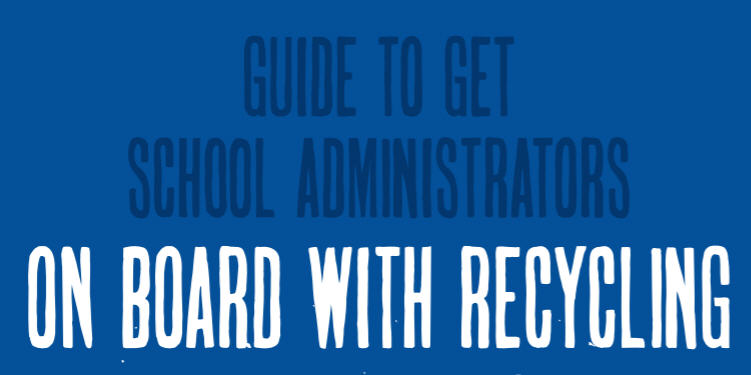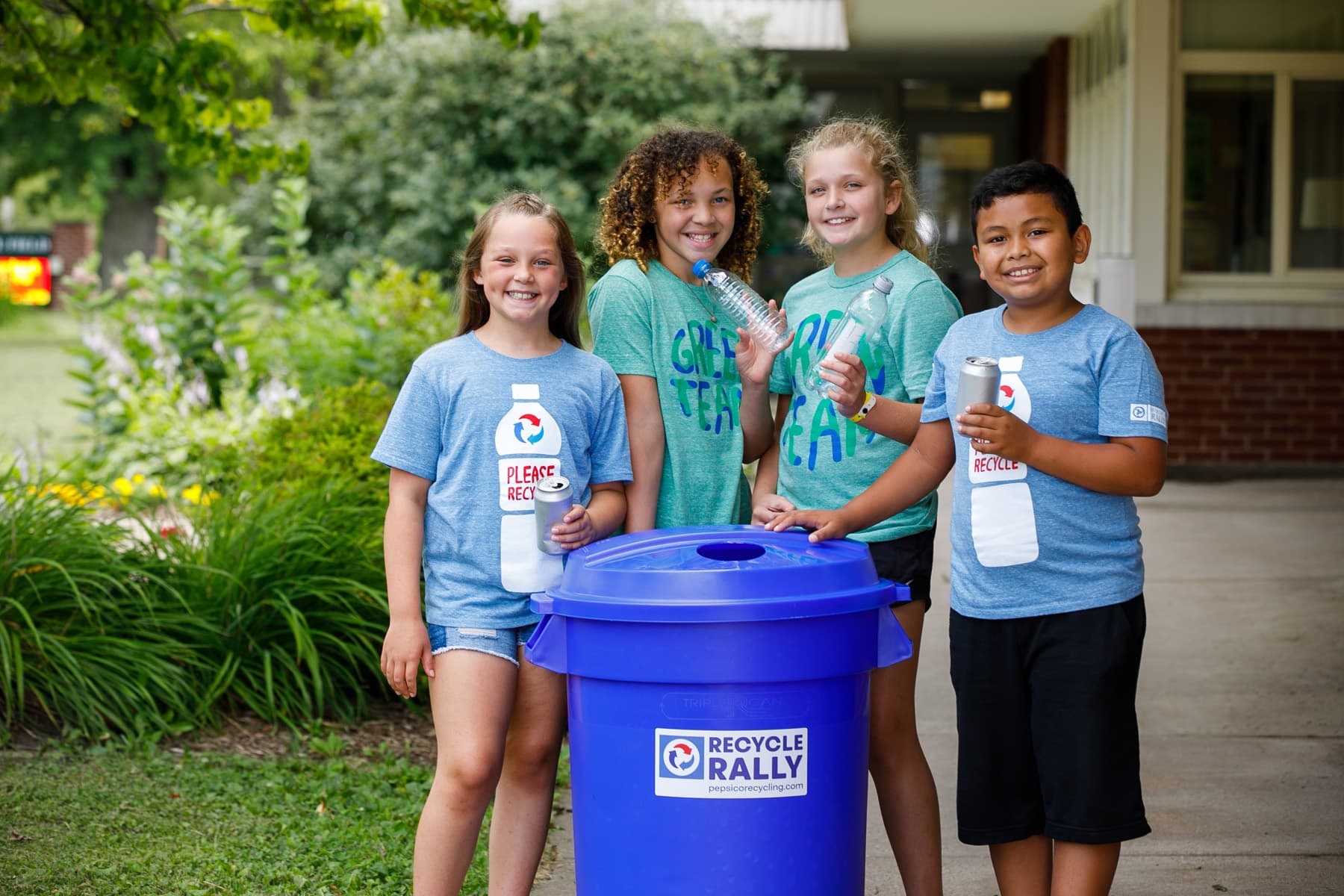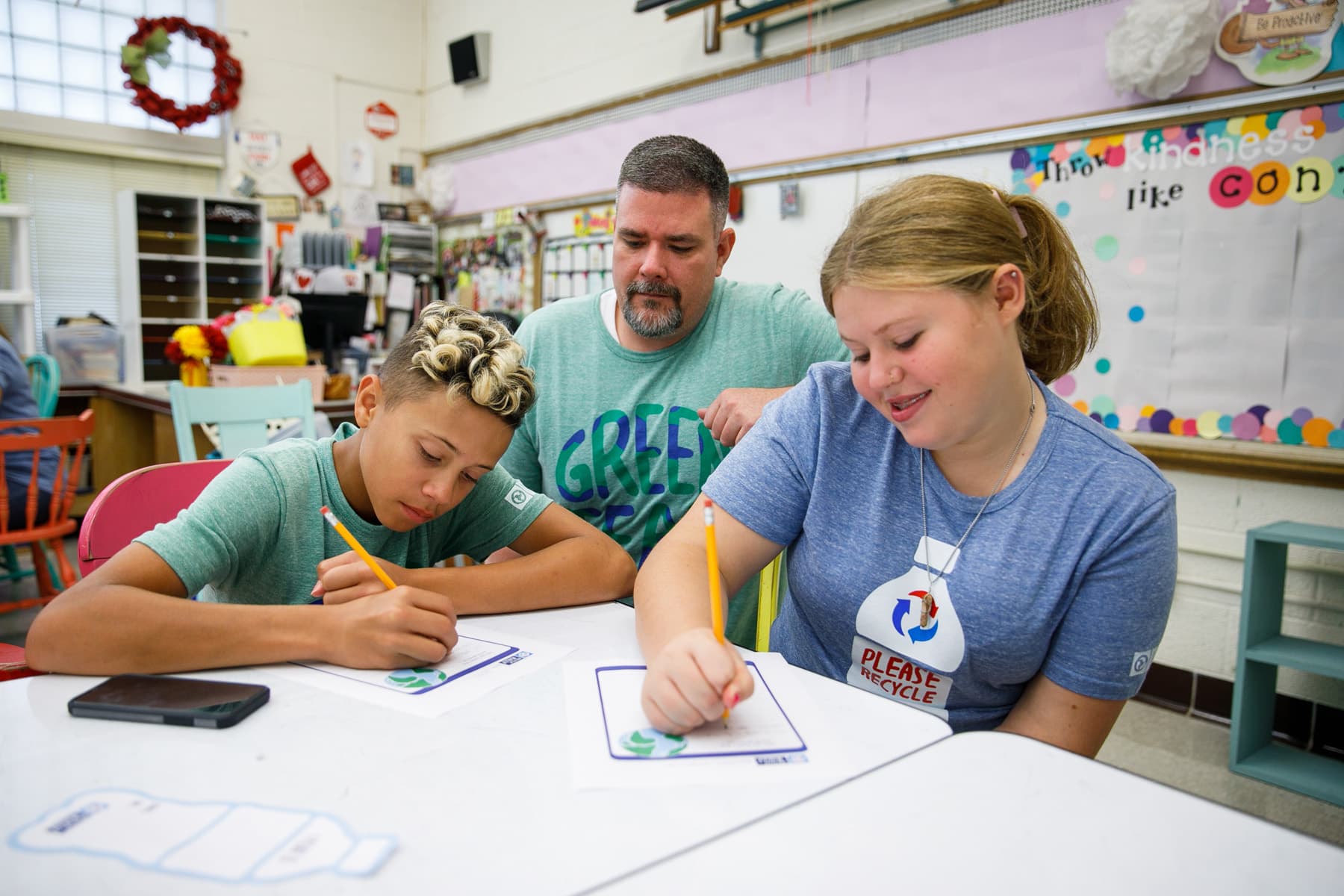Free Guide: How to Get Administrators On Board With School Recycling
Including what to say and the benefits to schools.

Looking to get your school leadership to buy in to a recycling program? Here are some tips to make it a success. Are you a parent, teacher, or school staff member considering taking active steps to begin your program? This free printable guide will help prepare you to explain your vision for a school recycling program to school administrators. The checklist and resources in the guide are a great place to start.

School Recycling Plan Starter Checklist
Take these first steps to start the process of learning how recycling works in your community. This helps prepare you to bring others on board with your new program.
- Check to see if your school, city, or state has sustainability/zero waste goals.
- Familiarize yourself with the benefits of a school recycling program.
- Be able to explain how sponsored school recycling programs such as Recycle Rally can benefit your school.
- Research what kind of recycling resources are available in your community.
- Identify potential partners within the school, such as PTA, janitorial, willing teachers, etc.
- Request a meeting with your principal (or other key decision maker).
School Recycling Benefits
Use these talking points to prepare for a discussion with school administration.
Recycling doesn’t cost as much as you think
- School recycling programs can save money on garbage collection by keeping recyclables out of the trash can.
- For instance, over a couple of years of recycling and composting, Sioux Trail Elementary School went from producing enough trash to fill a four-yard dumpster daily to only filling a one-yard dumpster weekly.
- “Recycling was the catalyst for our school’s ongoing waste diversion and sustainability program. Since 2007, we’ve expanded recycling from simply collecting paper to recycling plastic bottles, aluminum cans, and even composting food waste. In addition to recycling, we performed waste audits and right-sized our waste pick-ups. As a result, our school has seen approximately 20% savings by diverting garbage from the waste stream, right-sizing dumpsters, and reducing the number of weekly collection. Overall, our school had a renewed interest in doing the right thing.” -Lisa Johnson, School District 197 Sustainability Manager, Dakota County Schools
- Students, organizations, and/or clubs can run school recycling programs, saving staff time.
- Save money by partnering with your city, county, or non-profit organizations.
Using recycling as an opportunity for learning takes education to the next level
- Recycle Rally provides an array of related lessons to use in the classroom.
- Recycling engages kids in deeper educational lessons in math, science, civics, and practical application. For example, teach math, science, and social studies lessons by relating them to students’ practical hands-on experience. In addition, try sorting, counting, weighing recyclables and tracking progress, working toward goals, etc.
- Students can help weigh and measure how much they recycle. They can graph and project trends, as well as conduct experiments, develop and test hypotheses, and more.
- Students can learn to relate their recycling efforts to a larger impact on society. For instance, they may learn the number of greenhouse gases avoided in terms of number of trees they’ve planted. Or, they could calculate the amount of energy saved in terms of houses powered for a year.
Recycling programs can help develop student leadership and organizational skills
- Recycling reinforces environmental themes that students learn about in school.
- Many schools have shared feedback that a student-led Green Team that supports recycling programs encourages leadership and organizational skills.
- Students can use real-world skills to improve their school’s recycling and participation rates. These include teamwork, organizational management, math, science, marketing, and presentation skills.
- Recycling serves as an example of the connections between individual actions and environmental stewardship. Support of a recycling program turns these lessons into practical application. Students learn to be good stewards of our planet.
A recycling program can enhance your school’s connection to the community
- Involving parents and after-school clubs in a recycling program connects your community with a common sustainability goal.
- Students will learn about an important industry and all the steps people involved in making it happen.
- Recycling doesn’t stop at the recycling bin! It takes a village to collect, process, and remanufacture these items into new, usable items.
- Involve concerned parents and other community members in the recycling programs as volunteers. They can help promote the program, volunteer to transport, or keep track of recycling to make it easier for schools to calculate their impact.
- Get positive media exposure for your school or opportunities to earn recognition from outside organizations. Draw their attention by increasing recycling and involving your community to make a positive difference.
Reaching Out to Recycling Stakeholders
You’ll be hard-pressed to find a school leader who doesn’t have a desire to promote efficient and sustainable systems that result in less waste. However, the role of a principal is comprehensive. They have competing instructional, safety, and compliance demands, and can’t do it all alone. They will likely need support at the district level, as well as your support and assistance.
A good place to begin is by setting up a meeting with the principal. The goal of the first meeting is, in part, selling the value of recycling. But the greater part is learning how to make it happen.
An email to de principal can be a good starting point to reach out and set up a meeting. Then, explore these key questions with your school leader, and communicate that you’re a partner in this process.
A Conversation With Your Principal
Here are some questions you’ll want to ask when you talk with a principal or administrator. First, sell the value of a recycling program. Then, find out what you’ll need to make it happen.
- What would you envision as an ideal recycling program at our school?
- What steps would we need to take to implement a recycling program?
- Which other stakeholders in the district need to be engaged to make this initiative successful? In which order should I contact them? How do you recommend I reach out to them? (Be sure to record the names and contact information and ask your principal to help make introductions.) Possible responses:
- School Business Administrator
- Facilities Director
- Custodial Supervisor
- Superintendent
- How can I (as parent/teacher/community member) help you to make this happen? What next steps do you recommend? (Principals can’t do it alone—they will likely rely on you to push the program forward)
- Have your principal review and approve your email to recruit potential volunteers before sending.
- What are the primary barriers you would expect to encounter?
- Who do you think some champions would be?
Next, follow up (either through the principal or directly if allowed) with each of the key stakeholders. Work with them to develop the systems needed to support a successful recycling program!
For Schools That Are Currently Recycling
Already recycling? Here’s how to get administrators to help support expanding your existing programs.
- What does recycling look like now in school? Classroom? Cafeteria?
- Where does it work well? Why do you think it works?
- What’s not working? Why, in your opinion, is it not working? OR What are the major roadblocks to sustainable student-driven recycling in the school? Possible responses from principal’s perspective:
- Kids don’t know how
- Kids don’t understand the WHY
- Teachers don’t reinforce it in the classroom
- Classroom might not have proper bins
- Custodians might be collecting classroom bins and dump into one bin at night when cleaning—what’s their accountability/incentive?
- Who is regularly supervising and supporting this learning process for kids?
- Which other stakeholders in the district need to be engaged to make this initiative successful? In which order should I contact them? How do you recommend I reach out to them? (Be sure to record the names and contact information and ask your principal to help make introductions.) Possible responses:
- School Business Administrator
- Facilities Director
- Custodial Supervisor
- Superintendent
- How can I (as parent/teacher/community member) help you to make this happen? What next steps do you recommend? (Principals can’t do it alone—they will likely rely on you to push the program forward.)
- Have your principal review and approve your email to recruit potential volunteers before sending.
Get inspired by reading about how these school leaders created a schoolwide recycling program!
Learn More

Recycle Rally
Recycle Rally is a free K-12 program that provides rewards and tools to help enhance recycling at your school!
Explore now
Additional Resources
Our comprehensive library of resources was designed to inspire the next generation of green leaders.
Explore now

